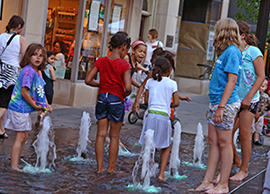Anyone in need of a place to warm up as temperatures dip can find a range of options in Oak Park. Local sites include the following:
Warming center:
- Good Shepherd Lutheran Church, 611 Randolph St., serves as Oak Park's primary warming center. The warming center is activated when outdoor temperatures drop below 20 degreees and/or extreme snow and ice shut down public facilities or transportation for an expected period of four hours or more.
Daytime warming centers:
- Oak Park Public Library, 834 Lake St., open 9 a.m. to 9 p.m. Monday – Thursday, 9 a.m. to 6 p.m. Fridays, 9 a.m. to 5 p.m. Saturdays, Noon to 5 p.m. Sundays
- Oak Park Public Library – Dole Branch, 255 Augusta St., open 10 a.m. to 9 p.m. Tuesday – Thursday, 10 a.m. to 6 p.m. Fridays, 10 a.m. to 5 p.m. Saturdays, Noon to 5 p.m. Sundays
- Oak Park Public Library – Maze Branch, 845 Gunderson Ave., open 10 a.m. to 9 p.m. Monday – Thursday, 10 a.m. to 5 p.m. Saturdays, Noon to 5 p.m. Sundays
Click here for a downloadable flyer with information about local emergency warming centers.
Click here to visit the Oak Park Public Library website to verify hours and for information about potential closures.
If transportation to a warming center is needed, call the Oak Park Police Department’s non-emergency number 708.386.3800.










